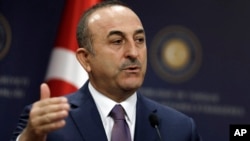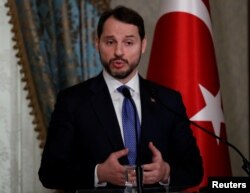U.S. President Donald Trump's decision to end waivers from sanctions for countries importing Iranian oil threatens to further escalate tensions with Turkey.
"If there is any individual or entities who are engaging in sanctionable conduct, we will sanction that," warned Brian Hook, U.S. senior policy adviser to the secretary of state, and special representative for Iran.
The waivers for China, India, Japan, South Korea and Turkey are set to expire in May, after which the countries could face U.S. sanctions. The Iranian sanctions were reinstated after Trump withdrew from the 2015 nuclear deal between Iran and six world powers.
Turkish foreign minister Mevlut Cavusoglu slammed Washington's latest move.
"We support an international system and multilateralism established through legal rules. The fact that a country alone disrupts this and puts pressure on everyone to comply with its decisions is damaging and jeopardizing the international legal system," Cavusoglu said at a press conference Tuesday.
"Why are you putting pressure on other countries? Take your own measures. Why do other countries have to obey your unilateral decisions?" he asked.
Cavusoglu dismissed Washington's proposal of Saudi Arabia and the United Arab Emirates as alternative suppliers.
"Pushing to buy oil from other countries besides Iran goes too far," he tweeted Monday.
Turkish energy needs
Analysts point out that energy-hungry Turkey will be reluctant to rely on supplies from either the UAE or Saudi Arabia, given that relations remain deeply strained with both countries.
Washington said it is working hard to find a solution to Turkish energy needs.
"We've worked through significant diplomatic overtures and helped on the technical side with Iraq to boost their output," said Francis Fannon, assistant secretary of state for energy resources, speaking Tuesday at a telephone press briefing. "And we are very pleased to see significant volumes now imported into Turkey, and those overtures will continue."
While condemning Washington over the reintroduction of Iranian sanctions, Ankara has cut oil imports from Iran to comply with U.S. waiver requirements. Turkey also is continuing to increase its cooperation with Iran.
"Ankara is developing deepening ties with Tehran. The Syrian civil war is providing increasing common ground," said Iranian expert Jamshid Assadi of France's Burgundy Business School. "They still have very many differences with Iran, but by all means, now Turkey and Iran are closer to each other on many issues."
Tehran and Ankara back opposing sides in the Syrian civil war, but along with Moscow, the three countries are working together under the auspices of the "Astana Process" to end the conflict.
Ankara's deepening relationship with Moscow is another point of tension with Washington. Turkey is already facing U.S. sanctions over the procurement of Russia's S-400 missile system. The sale violates the Countering America's Adversaries Through Sanctions Act, or "CAATSA," which prohibits the purchase of specific Russian military equipment.
Turkish economy
The Turkish economy is still recovering from the previous clash with Washington. Last year, the Turkish lira collapsed after Trump imposed sanctions on Ankara over the detention of American pastor Andrew Brunson, who has since been released.
"If the crisis continues with the United States, it will probably devastate the economy," said international relations expert Soli Ozel of Istanbul's Kadir Has University.
The U.S. Treasury is still considering penalties that could run into billions of dollars against Turkish state lender Halkbank for violations of previous U.S. Iranian sanctions. Last year, a New York court convicted and jailed a senior Halkbank official on Iranian sanction-busting charges.
Until now, Ankara has failed in its efforts to resolve the Halkbank fine, along with removing the threat of further investigations into Turkish state lenders, by U.S. authorities. Analysts claim Washington is likely using the threat of fines and further investigations as leverage over Ankara.
However, Ankara could yet be banking on Trump to thwart any new sanctions. Earlier this month, in a break with diplomatic protocol, Trump met in the Oval Office with Berat Albayrak, Turkish President Recep Tayyip Erdogan's son-in-law and economics chief. Albayrak reportedly has developed a close relationship with Jared Kushner, Trump's adviser and son-in-law.
"The photo opportunity in the Oval Office was not something negligible and the fact two sons-in-law met and spoke," said Ozel. "I am not sure the expectation that Trump will intervene and save Turkey from the fires of Congress is necessarily a realistic expectation, but we shall see."
Observers say Erdogan is aware that standing up to Washington plays well with his constituents, but with no scheduled elections for four years, an economy in recession and a vulnerable currency, the Turkish president may yet bow to U.S. pressure.
"These are cliffhanger weeks for Turkey, where Mr. Erdogan is playing an all-or-nothing game. We are at the proverbial fork in the road," said analyst Atilla Yesilada of Global Source Partners.




